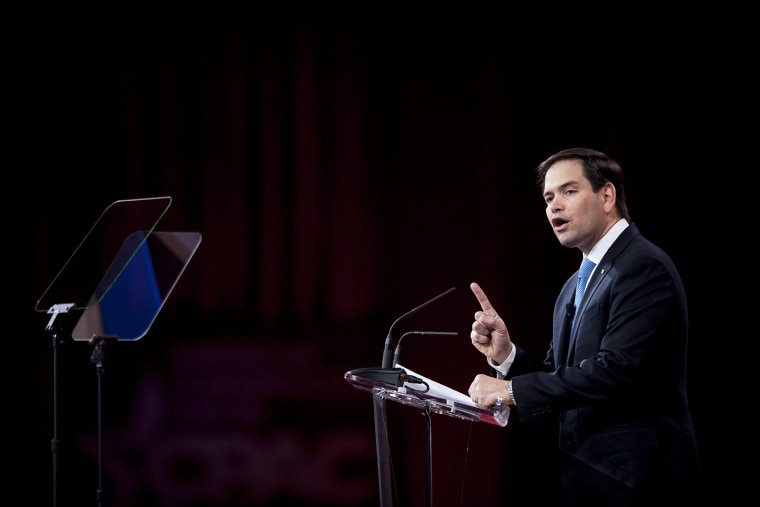When Sen. Marco Rubio (R-Fla.) sat down this week with NPR's Steve Inskeep, the Republican senator said immigration reform is effectively dead, at least until 2017, because President Obama acted on his own. It led to this interesting exchange:
INSKEEP: How do you keep from getting hammered on that in a general election where the Hispanic vote may be very important? RUBIO: Well, I don't know about the others, but I've done more immigration than Hillary Clinton ever did. I mean, I helped pass an immigration bill in a Senate dominated by Democrats. And that's more than she's ever done. She's given speeches on it, but she's never done anything on it. So I have a record of trying to do something on it. It didn't work because at the end of the day, we did not sufficiently address the issue of, of illegal immigration and I warned about that throughout that process, as well, that I didn't think we were doing enough to give that bill a chance of moving forward in the House.
This, in a nutshell, illustrates why immigration is effectively a Mobius strip for Rubio's presidential campaign. We've seen candidates try to have it both ways on a controversial issue, but on immigration, the Florida Republican is basically trying to maintain several positions at once, most of which contradict each other.
Rubio helped write a bipartisan reform bill. Then he criticized it. Then he voted for it. Then he abandoned it. Now he's running against it, while bragging about having worked on it.
Even the most charitable supporter of the senator would find it tough to describe this approach as coherent. (And his claim that the bill didn't "sufficiently address" the issue of illegal immigration is plainly at odds with the facts.)
As for the comparison with Hillary Clinton, it's true that she was Secretary of State during the legislative fight, and not in a position to participate in the debate. But at this point, only one announced presidential candidate actually supports the reform package Marco Rubio helped write -- and it's not Marco Rubio.
As for the political impact, I've seen some commentary this week that Rubio's support for an immigration bill the Republican base abhors won't undermine his national candidacy too much. Jonathan Bernstein had a good piece along these lines, pointing to the fact that Mitt Romney managed to overcome his Obamacare-like health care law during the 2012 Republican primaries, so Rubio can certainly overcome his authorship of the bill the GOP sees as "amnesty."
"[A]ll Rubio has to do on immigration is convince his (former) opponents that he is one of them," Bernstein wrote.
Perhaps, but I'm not sure the senator will find it that easy. For one thing, Romney faced much weaker competition, and Republican voters who disapproved of his health care plan didn't have much in the way of credible options. Rubio, on the other hand, will be in a crowded field, filled with real challengers.
For another, as the NPR interview helps prove, Rubio is still kinda sorta proud of his work on the immigration bill his party now rejects.
It's a problem for which there is no easy solution.
Postscript: For more of Rubio's thoughts on immigration, be sure to check out his interview with msnbc's Kasie Hunt from yesterday.
